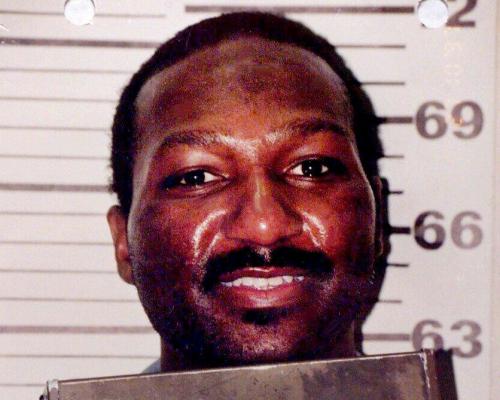
For attorney Kelley Henry, the visible blood was the first indication that the execution of her client was going wrong.
At 10.15am on Tuesday inside the Riverbend maximum security prison in Nashville, the longtime Tennessee death row lawyer watched as staff attempted to place an IV into the right arm of Byron Black. Black was locked on to a gurney with crisscrossing black straps over his chest, stomach and legs, and Henry saw blood ooze from the injection site.
The staff managed to insert the IV and cleaned the wound, but then struggled for roughly 10 minutes before finding a vein in Black’s second arm, Henry recalled.
The IVs would be used to inject a lethal quantity of pentobarbital, a sedative, into Black, a 69-year-old wheelchair user with lifelong intellectual disabilities, dementia, brain damage, kidney failure, severe heart failure and prostate cancer. The drug was meant to render him unconscious as it stopped his breathing and killed him.
“You’re almost home,” the spiritual adviser by Black’s side told him as the lethal injection began.
While the reverend touched Black’s face to comfort him, Black started breathing and sighing loudly, and after several minutes groaned in agony, saying, “I can’t do this,” and “It hurts so bad,” according to Henry and several journalists who witnessed the execution. He repeatedly lifted his head.
“I’m so sorry. Just listen to my voice,” said the reverend, who sang, “The Lord is my shepherd.”
Black eventually became still and was pronounced dead at 10.43am, roughly 10 minutes after he had cried in pain.
Tennessee had argued that Black would not consciously experience drawn-out pain. But outside the chamber, seven reporters shared similar accounts suggesting that was exactly what had occurred, the final journalist saying: “It was unanimous among all of us that we saw him in distress.”
“Something went horribly, horribly wrong, and I don’t know what it is yet, and all I could do was take notes and watch,” Henry, who represented Black for 25 years, told the Guardian on Thursday. “For him to lift his head up several times and say it hurts, I really wasn’t prepared. I could not believe it was happening. It was horrific.”
The execution – which Henry said she considered “100% botched” and amounted to “torture” – appears to be the latest in a long line of troubled state killings.
Despite historically low public support for the death penalty, a handful of conservative states have continued to aggressively pursue executions, maintaining the US’s status as a global leader in capital punishment. Donald Trump, who oversaw 13 federal executions in his first term, has pledged to revive capital punishment, reversing Joe Biden’s moratorium on federal killings.
Reports of botched executions include a 2024 Idaho execution halted after eight failed attempts to find a vein for lethal injection; an Alabama killing using an experimental nitrogen gas method that caused “violent” shaking last year; and a 2021 lethal injection in Oklahoma that caused vomiting and convulsing. A Guardian report in May revealed that South Carolina appeared to botch an execution by firing squad, a rarely used method now making a comeback, with autopsy records suggesting shooters missed the target area on the man’s heart.
Tennessee’s department of correction declined to comment. A spokesperson for the Tennessee governor, Bill Lee, did not respond to an email. Lee declined to grant Black clemency.
Jonathan Skrmetti, the state’s attorney general, defended the execution in a statement, writing: “Every American has the right to their own opinion about the death penalty, but courts rely on actual facts and actual law, not on theatrics and passion. Black filed a dozen separate legal challenges to avoid his sentence. Every one of them failed. Byron Black’s execution was entirely legal.”
Black’s apparently excruciating death was the final chapter in a life that his lawyers said was marked by challenges.
A fatal loophole in the law
Black spent 35 years on death row after he was convicted of the 1988 homicides of Angela Clay, his 29-year-old girlfriend, and her two daughters, Latoya, nine, and Lakeisha, six.
Black has maintained his innocence, though the critical courtroom battles have revolved around his intellectual disability, according to the Nashville Banner, which reported that Black’s attorney in 1989 had argued he was incompetent to stand trial. During sentencing, he did not understand he had already been found guilty, his lawyers have said.
Black suffered from prenatal alcohol exposure and was exposed to toxic lead as a toddler, contributing to lifelong cognitive and developmental impairments, his attorneys said. He struggled throughout school, endured traumatic brain injuries from playing football and was never able to live independently, having difficulties performing basic chores as an adult.
When Henry first met Black in 2000, she was pregnant with her second son, and they bonded over conversations about family: “Getting to know Byron is getting to know his family. He always wanted to talk about his family’s reunions, which are just legendary.” She learned about how he had relatives in all 50 states, tracing their roots to ancestors enslaved by President James Polk.
“He was always, always smiling. Talking to him was like sitting on the front porch having a glass of iced tea,” she said, recalling how he wrote down everyone’s birthday in a makeshift calendar and never missed them. He never complained about prison treatment nor asked about his case. “I would give him updates, and his response was always, thank you so much. I never had a visit where he didn’t say, ‘God bless you, I appreciate you,’ including up until the very last moment.”
Henry, a federal public defender, watched as Black’s physical and mental health deteriorated over two decades on death row. For years, he struggled to walk, but staff at the prison would wheel him into his legal visits on an office chair, before eventually giving him a wheelchair, she said. When prostate cancer surgery went wrong, he nearly died, she said. “Still, he never said a negative word about the doctor.”
The state conceded in 2022 court proceedings that Black was, in fact, intellectually disabled under current laws. The Tennessee legislature had amended statutes in 2021 to align its definitions of intellectual disabilities with contemporary medical standards. Executing people with Black’s condition is prohibited.
The courts, however, ruled that the new law did not apply to him, because Henry’s intellectual disability claim had been considered and rejected two decades earlier under the old standards.
If he had filed the disability claim for the first time after the 2021 reform, his execution would have been deemed illegal, Henry said.
It’s a procedural loophole that torments Henry, who said she feels responsible for what happened since it was her original claim that was rejected 20 years ago.
“Every execution takes a piece of your heart,” said Henry, who has represented 13 people who were executed, three of which she witnessed. “But this one hurts so much … Because I raised the intellectual disability claim when I did, he is dead. The law was wrong, the law changed, and he couldn’t get due process because we’d raised it before. And I just cannot reconcile that.”
‘I won’t forget you’
In the weeks leading up to the execution, Black’s attorneys had voiced significant concerns over the procedure, arguing that there was a serious risk that his defibrillator, implanted to regulate his heart disease, would respond to the injection by repeatedly shocking him, causing protracted, agonizing pain. But Tennessee’s supreme court allowed the execution to proceed with the device activated.
Henry said initial evaluation of the device after his death showed that it did not shock him.
Black’s lawyers now hope that the autopsy, which will take weeks to complete, will help make clear what did go wrong.
It’s possible the pentobarbital entered his muscle tissue, instead of his veins, due to the IV insertion problems, she said. The drug may have failed to flow properly due to the tight straps constraining his body, which also could have masked convulsions indicating pain. He may have endured pulmonary edema, a condition seen in others executed by injection, where the lungs fill with fluid, causing a sensation akin to suffocation and drowning.
Henry said the lack of transparency around where the state obtained the drug raised fears the supply could be subpotent, improperly stored or have other problems.
The state’s attorneys have argued that the pentobarbital should make people unresponsive and unable to perceive pain, but Black’s repeated lifting of his head while groaning in agony suggested otherwise, she said.
Skrmetti, the attorney general, said in his statement that the defibrillator not shocking Black was “just as the state’s medical expert predicted”. He also condemned the criticisms of the drug, saying that in previous litigation, Black’s lawyers had argued that pentobarbital had lower risk of pain compared to other lethal injection drugs.
Nine days before the execution, Henry had to explain to Black that she was running out of options to save him. The two wept, she recalled: “He grabbed me and held me really, really tight and said, ‘I want you to know that what you did mattered.’”
Black made no final statement in the execution chamber.
After Black was pronounced dead, Henry stood at a podium in front of television cameras and condemned the state for executing “a gentle, kind, fragile, intellectually disabled man in violation of the laws of our country simply because they could”. He said: “What happened here was the result of pure, unbridled bloodlust and cowardice. It was the brutal and unchecked abuse of government power. It was the result of a failed criminal legal system.”
She told the crowd Black had said he was shy about speaking, but had asked her to read a message.
“He wanted his friends and family to know: ‘I love you and I won’t never forget you. All of our relationships have been very special. It was my pleasure in meeting everybody and the way we connected with each other,” she read, through tears. “And to his legal team, who I know is watching this, keep doing what you’re doing. God gave you a gift. You have power, and I can feel it.”






